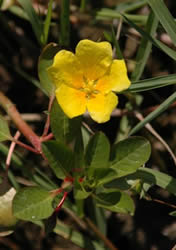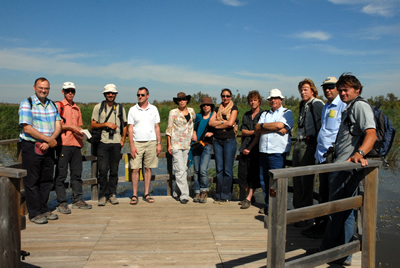
Expert Working Group for performing PRAs on
Ludwigia grandiflora and L. peploides
Montpellier, FR, 2010-06-01/04
Ludwigia peploides and L. grandiflora are widespread in the South and West of France but their distribution is still very limited in other parts of France, as well as in other EPPO countries such as Belgium, Germany, Greece, Ireland, Italy, the Netherlands, Spain and the UK where invasions are at an early stage. These species were added on the EPPO List of Invasive Alien Plants in 2004. The assessment of these species through the EPPO prioritization process for invasive alien plants in 2009 revealed that they represent high priorities for an EPPO PRA as they could spread to further EPPO countries and have major negative impacts on agriculture and the environment.
The overall conclusion of the Expert Working Group on L. peploides and L. grandiflora is that aquatic habitats (static or slow-flowing waters) of the Mediterranean and Atlantic Western countries of the EPPO region are considered the most at risk. The major pathway of entry for these species is intentional import for ornamental purposes. Indeed, the species is currently traded as an ornamental plant in EPPO countries, and is imported from Indonesia, Singapore, Malaysia, etc. The species can spread very easily whithin a catchment by vegetative fragments dispersed by animals (eg. by coypu) or by water flow.

Ludwigia peploides – View more pictures ![]()
The species may also spread through human activities such as management practices of water bodies or through recreation activities (eg. boating, fishing). Impacts of these species are considered as major, as they interfere with agricultural production, ecosystem services and human use of water bodies (e.g. deterioration of dams and infrastructures, loss of recreation areas, increase in flood risk, etc.). For these reasons, management activities have been undertaken, costing thousands of euros. In addition, the dominance of Ludwigia spp. is extremelly detrimental to the environment and leads to local loss of floral biodiversity, as well as faunal biodiversity (for macro-invertebrates and fishes).
The conclusions of the EWG will be reviewed by different bodies in the EPPO system in 2011.

The Expert Working Group was composed of:
Mr Mustafa Selçuk Basaran, Plant Protection Central Research Institute (TR)
Mr Alain Dutartre, CEMAGREF (FR)
Mr Guillaume Fried, LNPV Station de Montpellier (FR)
Mr Jonathan Newman, Aquatic Plant Management Group, CEH Wallingford (GB)
Mr Uwe Starfinger, Julius Kühn Institute (DE)
Mr Johan Van Valkenburg, Plant Protection Service (NL)
EPPO Secretariat: Ms Sarah Brunel
